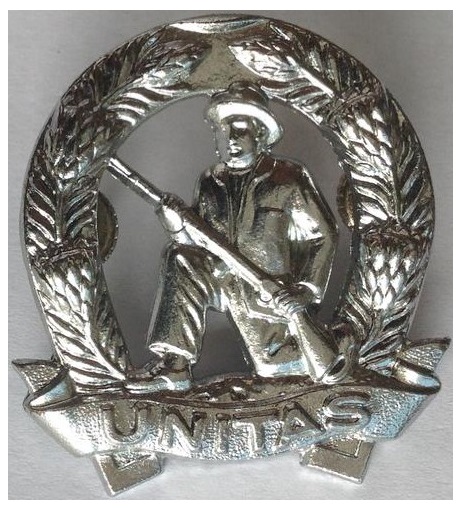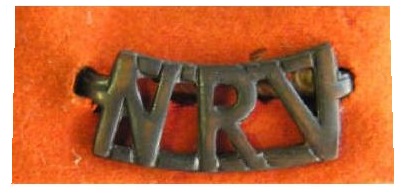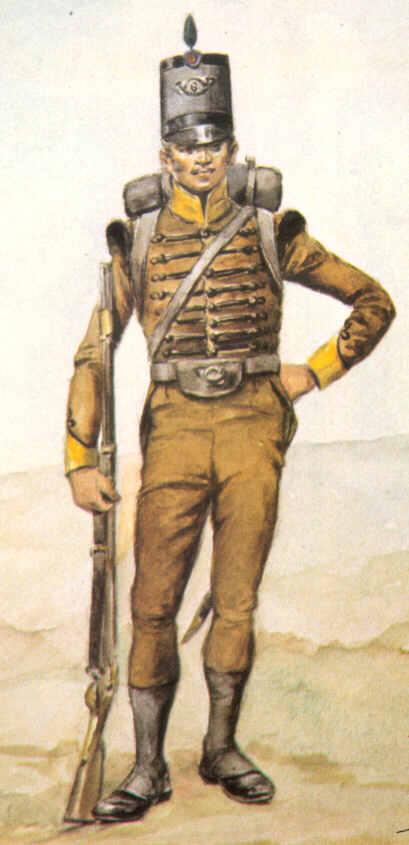|
Rouxville Commando
Rouxville Commando was a light infantry regiment of the South African Army. It formed part of the South African Army Infantry Formation as well as the South African Territorial Reserve. History Origin With the Orange Free State Republic Rouxville Commando was with General de Wet during the battle of Sanna's Post outside Bloemfontein when seven guns and 117 wagons were captured from the British. See: Battle of Sanna's Post With the UDF By 1902 all Commando remnants were under British military control and disarmed. By 1912, however previous Commando members could join shooting associations. By 1940, such commandos were under control of the National Reserve of Volunteers. These commandos were formally reactivated by 1948. With the SADF During this era, the unit was mainly involved in area force protection, cordones and search operations assisting the local police and stock theft control. With the SANDF =Amalgamation= By 1997, Rouxville Commando amalgamated with Zastron Co ... [...More Info...] [...Related Items...] OR: [Wikipedia] [Google] [Baidu] |
Orange Free State Republic
The Orange Free State ( nl, Oranje Vrijstaat; af, Oranje-Vrystaat;) was an independent Boer sovereign republic under British suzerainty in Southern Africa during the second half of the 19th century, which ceased to exist after it was defeated and surrendered to the British Empire at the end of the Second Boer War in 1902. It is one of the three historical precursors to the present-day Free State province. Extending between the Orange and Vaal rivers, its borders were determined by the United Kingdom of Great Britain and Ireland in 1848 when the region was proclaimed as the Orange River Sovereignty, with a British Resident based in Bloemfontein. Bloemfontein and the southern parts of the Sovereignty had previously been settled by Griqua and by '' Trekboere'' from the Cape Colony. The ''Voortrekker'' Republic of Natalia, founded in 1837, administered the northern part of the territory through a ''landdrost'' based at Winburg. This northern area was later in federation with t ... [...More Info...] [...Related Items...] OR: [Wikipedia] [Google] [Baidu] |
Sanna's Post
Sanna's Post (a.k.a. Korn Spruit) was an engagement fought during the Second Boer War (1899-1902) between the British Empire and the Boers of the two independent republics of the Orange Free State and the South African Republic. Background In early 1900, the British army, in overwhelming strength, had occupied Bloemfontein, capital of the Orange Free State, and were preparing to drive north to Pretoria, capital of the Transvaal. Field Marshal Lord Roberts, commander in chief of the British forces, believed that with the capture of the capitals of both republics, the war would be all but over. While the Burghers of the South African Republic prepared to defend their capital, with little prospect of success, the Free State Boers, inspired by President Martinus Steyn, the spiritual heart of the Boer resistance, and Christiaan de Wet, their foremost field general, regrouped and prepared to continue the conflict through unconventional means. Their action at Sanna’s Post was the f ... [...More Info...] [...Related Items...] OR: [Wikipedia] [Google] [Baidu] |
Charles Nqakula
Charles Nqakula (born 13 September 1942) is a South African politician who served as Minister of Defence from September 2008 to 2009. He also served as Minister for Safety and Security from May 2002 to September 2008. Nqakula is married to former South African Minister of Defence and Military Veterans, Nosiviwe Mapisa-Nqakula MP. On 24 June 2012, South African President Jacob Zuma appointed Nqakula as High Commissioner to the Republic of Mozambique. Early life Charles Nqakula attended primary school in Cradock and secondary school in Lovedale, matriculating in 1963. He worked as a hotel waiter and wine steward, after which he became a clerk in the Department of Bantu Education. Journalism In 1966, Nqakula started as a journalist with the ''Midland News'', a regional weekly newspaper in Cradock. Seven years later, he became a political reporter with ''Imvo Zabantsundu'' in King William's Town. From 1976 he worked for the Daily Dispatch in East London until he was placed und ... [...More Info...] [...Related Items...] OR: [Wikipedia] [Google] [Baidu] |
Minister Of Police (South Africa)
The Minister of Police (formerly known as the Minister for Safety and Security) is a minister in the Government of South Africa with political responsibility for the Department of Police, including the South African Police Service, the Independent Police Investigative Directorate, the Private Security industry Regulatory Authority, and the Civilian Secretariat for Police. The current Minister of police is General Bheki Cele. References External links South African Police ServiceIndependent Police Investigative DirectorateCivilian Secretariat for PolicePrivate Security Industry Regulatory Authority {{SouthAfrica-gov-stub Police The police are a constituted body of persons empowered by a state, with the aim to enforce the law, to ensure the safety, health and possessions of citizens, and to prevent crime and civil disorder. Their lawful powers include arrest and t ... Law enforcement in South Africa ... [...More Info...] [...Related Items...] OR: [Wikipedia] [Google] [Baidu] |
Thabo Mbeki
Thabo Mvuyelwa Mbeki KStJ (; born 18 June 1942) is a South African politician who was the second president of South Africa from 14 June 1999 to 24 September 2008, when he resigned at the request of his party, the African National Congress (ANC). Before that, he was deputy president under Nelson Mandela between 1994 and 1999. The son of Govan Mbeki, a renowned ANC intellectual, Mbeki has been involved in ANC politics since 1956, when he joined the ANC Youth League, and has been a member of the party's National Executive Committee since 1975. Born in the Transkei, he left South Africa aged twenty to attend university in England, and spent almost three decades in exile abroad, until the ANC was unbanned in 1990. He rose through the organisation in its information and publicity section and as Oliver Tambo's protégé, but he was also an experienced diplomat, serving as the ANC's official representative in several of its African outposts. He was an early advocate for and leader o ... [...More Info...] [...Related Items...] OR: [Wikipedia] [Google] [Baidu] |
South African Commando System
The Commando System was a mostly voluntary, part-time force of the South African Army, but in their role as local militia the units were often deployed in support of and under the authority of the South African Police. Mission South Africa's Commando System was responsible for the safeguarding and protection of specific communities (usually rural, but sometimes urban). Commando units were usually referred to as area protection, a system which involved the whole community. The participants in the Commando System did not have military commitments outside of the areas they served and were responsible for the safety and security of their own communities. History Origin The Commando system existed from the 1770s. The early Boer Commando system was a conscriptive service designed to provide a quickly-trained fighting force. Commandos were a product of the First Boer War during which the fiercely independent Boers had no regular army. When danger threatened, all the men in a distr ... [...More Info...] [...Related Items...] OR: [Wikipedia] [Google] [Baidu] |
Zastron Commando
Zastron Commando was a light infantry regiment of the South African Army. It formed part of the South African Infantry Corps, South African Army Infantry Formation as well as the South African Territorial Reserve. History Origin Operations Under the UDF By 1902 all Commando remnants were under British military control and disarmed. By 1912, however previous Commando members could join shooting associations. By 1940, such commandos were under control of the National Reserve of Volunteers. These commandos were formally reactivated by 1948. Under the SADF During this era the Commando was mainly used for area force protection, search and cordones as well as stock theft control assistance to the rural police. Under the SANDF =Amalgamation= By 1997 Rouxville Commando was amalgamated with Zastron Commando. =Disbandment= This unit, along with all other South African Commando System, Commando units was disbanded after a decision by South African President Thabo Mbeki to disband a ... [...More Info...] [...Related Items...] OR: [Wikipedia] [Google] [Baidu] |
UDF Era National Reserve Of Volunteers Shoulder Tab
UDF may refer to: Astronomy * Ultra Deep Field, a view of the distant universe taken in 2004 by the Hubble space telescope ** UDF 423, a distant spiral galaxy ** UDF 2457, a red dwarf star Computing * Universal Disk Format, an operating-system-independent file system commonly used on DVD and other digital media * Uniqueness Database File, a Windows XP Professional configuration text file * User-defined function, a function provided by the user of a program or environment Organizations Politics * United Democratic Forces (ОДС), an electoral alliance in Bulgaria * United Democratic Forces of Belarus, a coalition of political parties participating as the main opposition group during the 2006 presidential election * United Democratic Front (Botswana) * United Democratic Front (Kerala), India * United Democratic Front (Mizoram), India * United Democratic Front (Malawi) * United Democratic Front (Namibia) * United Democratic Front (Pakistan) * United Democratic Front (South Afric ... [...More Info...] [...Related Items...] OR: [Wikipedia] [Google] [Baidu] |
South African Army
The South African Army is the principal land warfare force of South Africa, a part of the South African National Defence Force (SANDF), along with the South African Air Force, South African Navy and South African Military Health Service. The Army is commanded by the Chief of the Army, who is subordinate to the Chief of the SANDF. Formed in 1912, as the Union Defence Force in the Union of South Africa, through the amalgamation of the South African colonial forces following the unification of South Africa. It evolved within the tradition of frontier warfare fought by Boer Commando (militia) forces, reinforced by the Afrikaners' historical distrust of large standing armies. Following the ascension to power of the National Party, the Army's long-standing Commonwealth ties were afterwards cut. The South African Army was fundamentally changed by the end of Apartheid and its preceding upheavals, as the South African Defence Force became the SANDF. This process also led to ... [...More Info...] [...Related Items...] OR: [Wikipedia] [Google] [Baidu] |
South Africa Flag 1910-1912
South is one of the cardinal directions or compass points. The direction is the opposite of north and is perpendicular to both east and west. Etymology The word ''south'' comes from Old English ''sūþ'', from earlier Proto-Germanic ''*sunþaz'' ("south"), possibly related to the same Proto-Indo-European root that the word ''sun'' derived from. Some languages describe south in the same way, from the fact that it is the direction of the sun at noon (in the Northern Hemisphere), like Latin meridies 'noon, south' (from medius 'middle' + dies 'day', cf English meridional), while others describe south as the right-hand side of the rising sun, like Biblical Hebrew תֵּימָן teiman 'south' from יָמִין yamin 'right', Aramaic תַּימנַא taymna from יָמִין yamin 'right' and Syriac ܬܰܝܡܢܳܐ taymna from ܝܰܡܝܺܢܳܐ yamina (hence the name of Yemen, the land to the south/right of the Levant). Navigation By convention, the ''bottom or down-facing side'' of a ... [...More Info...] [...Related Items...] OR: [Wikipedia] [Google] [Baidu] |
Regiment
A regiment is a military unit. Its role and size varies markedly, depending on the country, service and/or a specialisation. In Medieval Europe, the term "regiment" denoted any large body of front-line soldiers, recruited or conscripted in one geographical area, by a leader who was often also the feudal lord ''in capite'' of the soldiers. Lesser barons of knightly rank could be expected to muster or hire a company or battalion from their manorial estate. By the end of the 17th century, infantry regiments in most European armies were permanent units, with approximately 800 men and commanded by a colonel. Definitions During the modern era, the word "regiment" – much like "corps" – may have two somewhat divergent meanings, which refer to two distinct roles: # a front-line military formation; or # an administrative or ceremonial unit. In many armies, the first role has been assumed by independent battalions, battlegroups, task forces, brigades and other, similarly s ... [...More Info...] [...Related Items...] OR: [Wikipedia] [Google] [Baidu] |
Light Infantry
Light infantry refers to certain types of lightly equipped infantry throughout history. They have a more mobile or fluid function than other types of infantry, such as heavy infantry or line infantry. Historically, light infantry often fought as Reconnaissance, scouts, Raid (military), raiders, and skirmisher, skirmishers. These are loose formations that fight ahead of the main army to harass, delay, disrupt supply lines, engage the enemy’s own skirmishing forces, and generally "soften up" an enemy before the main battle. Light infantrymen were also often responsible for Screening (tactical), screening the main body of a military formation. Post-World War II, the term "light infantry" evolved to include rapid-deployment units (including commandos and Airborne forces, airborne units) that emphasize speed and mobility over armor and firepower. Some units or battalions that historically held a skirmishing role have kept their designation "light infantry" for the sake of traditi ... [...More Info...] [...Related Items...] OR: [Wikipedia] [Google] [Baidu] |




